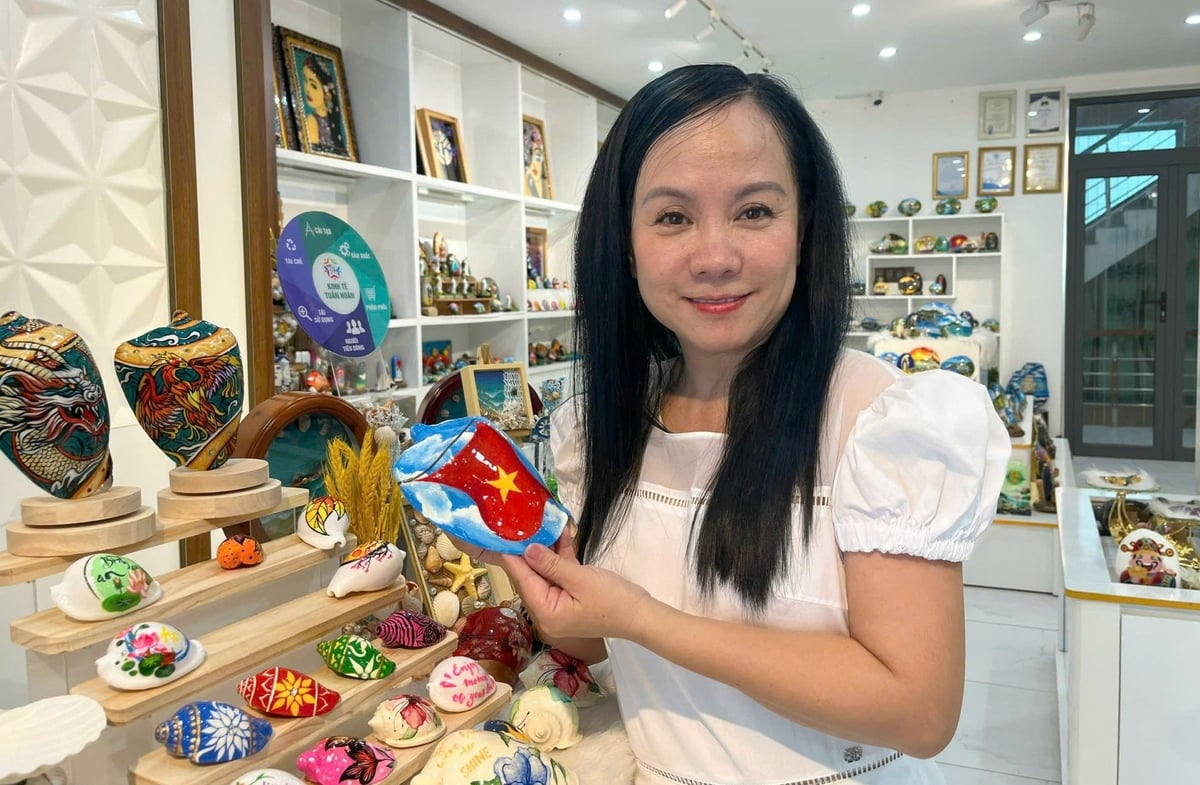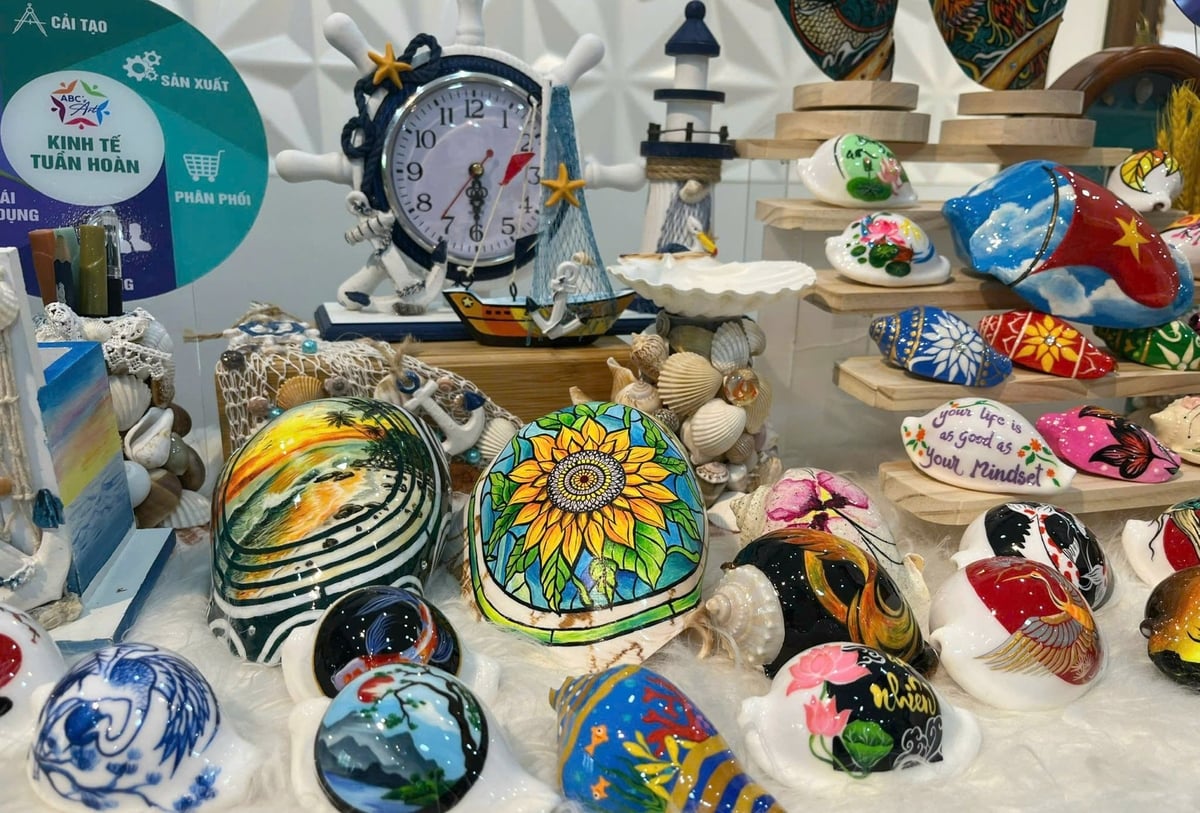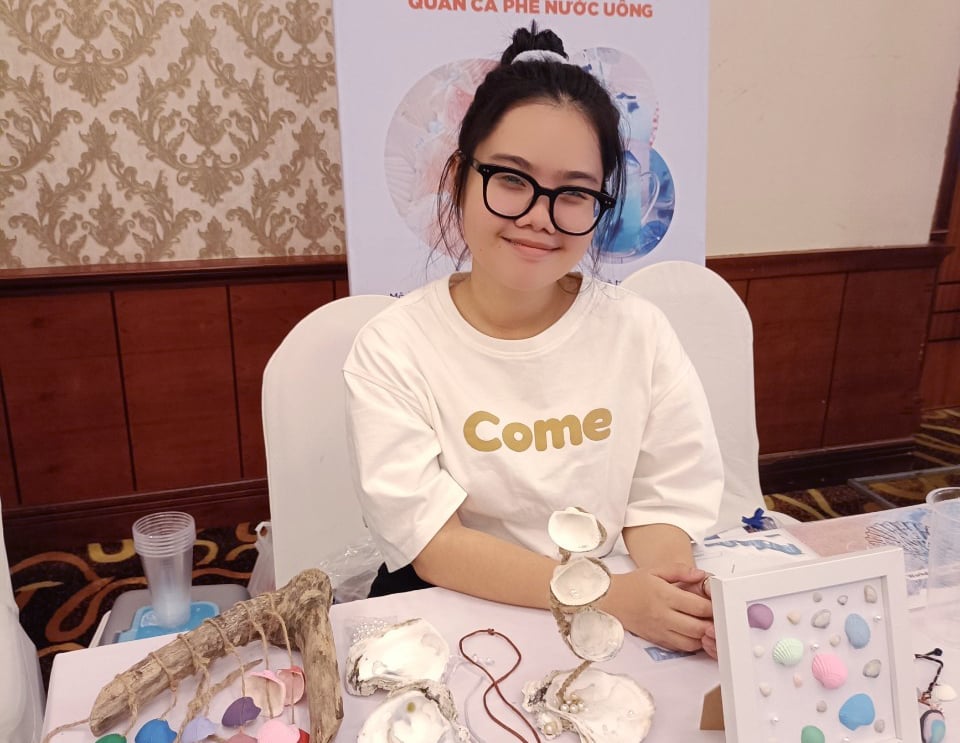October 17, 2025 | 21:26 GMT +7
October 17, 2025 | 21:26 GMT +7
Hotline: 0913.378.918
October 17, 2025 | 21:26 GMT +7
Hotline: 0913.378.918

Mrs. Nguyen Thi Hong Lan next to unique artworks creatively made from discarded clam and sea snail shells. Photo: Le Binh.
With a high volume of tourists and vibrant seafood processing activity, Ho Chi Minh City's restaurants, hotels, and processing facilities produce tons of discarded clam and snail shells every night. If not handled properly, this waste emits foul odors and is hard to decompose, severely impacting the environment.
Hai Lan Co., Ltd. (Ba Ria Ward, Ho Chi Minh City), established in 2019, initially specialized in artistic and decorative stones and later started collecting discarded clam and snail shells from restaurants and eateries. Through the skillful hands of Mrs. Nguyen Thi Hong Lan, the company's director, these raw shells were transformed into colorful, charming items or turned into paintings, dreamy scenes, and meaningful, elegant souvenirs.
These products are not only artistic but also contribute to reducing marine pollution and promoting the green and circular economy model.
Mrs. Lan shared, “Transforming discarded clam and snail shells into gift items is a creative solution that helps reduce pollution and generate economic value and employment. This is the sustainable development trend that the world is moving toward.”
She also explained her choice to use clam and snail shells as materials for her artwork, noting that each shell carries its own story – a memory of the ocean and a breath of the sea – the pristine beauty of nature. “Shells are not just materials but symbols of rebirth, representing the harmony between nature and art, helping me tell Vietnamese cultural stories to the world in a more unique and environmentally friendly way,” Mrs. Lan said.

From sea snail shells once thought to be discarded, they have been “clothed in new attire” and transformed into decorative products worth up to tens of millions of dong. Photo: Le Binh.
Hai Lan Company has signed a memorandum of understanding with OSB Investment and Technology Joint Stock Company (Alibaba's authorized agent in Vietnam) to sell its clam and snail shell products on the Alibaba e-commerce platform, expanding the consumer market and introducing them to tourists from around the world.
Currently, the company has developed over 100 models with about 3,000 products, priced from VND 40,000 to VND 20 million, depending on the type.
The love for the seaside and shells, along with the message of environmental protection, has also been passed on to students. Nguyen Le Minh Chau (a student at Vung Tau High School) once submitted a model to the Ba Ria - Vung Tau fisheries innovation contest titled “Workshop for recycled shell crafts combined with a seaside-style coffee shop.”
This model involves opening a café decorated mainly with clam and snail shells. The shop not only serves beverages but also allows customers to explore, take photos, and check in at various creatively decorated spaces following different themes. Visitors can even make their shell-based crafts under the guidance of the owner in a workshop setting.
“The workshop combined with a café is not only a place for all creative craft enthusiasts but also a place to relax after tiring days of work or study, unwind, and enjoy the sunset and sea breeze together,” Minh Chau shared.
In addition, the project's main activity is to make the most of discarded clam and snail shells, which many people consider waste, and to enhance the value of local seafood products by recycling them into handcrafted souvenirs that attract tourists. This helps spread a message of environmental protection.

Products from the project "Recycled seashell craft workshop combined with coastal-style coffee shop" by student Nguyen Le Minh Chau, Vung Tau High School. Photo: Le Binh.
Many businesses, such as Ton Van Group, produce items made from clam shells, snail shells, and pearls, including shirt buttons, fountain pens, spoons, jewelry, and more. These products are exported globally and generate millions of USD in annual revenue.
Other businesses, such as Nhat Minh Décor and Hung Thy, provide natural clam and snail shells for decorating handmade products like scented candles, wax melts, souvenirs, and shell mosaics for tourists. They also provide props for cosmetic or jewelry photography. These products utilize the natural beauty of the shells, creating a connection with nature, meeting the demand for green consumption, and promoting environmental awareness.
Many other artisans in Ho Chi Minh City have also devised creative solutions, turning polluting seafood waste into artistic items such as paintings, decorations, finely crafted jewelry, and high-value souvenirs.
Notably, artist La Nhu Long has transformed clam and snail shells into unique jewelry pieces like pendants, earrings, and bracelets in his “Sea Goddess” collection. These items are meticulously crafted, polished, deodorized, and combined with materials like gold and silver to enhance their aesthetic and commercial value. His collection has been recognized by the Vietnam Guinness World Records for having the largest number of handcrafted jewelry items made from clam and snail shells.
* USD 1 = VND 26,335. Source: Vietcombank.
Translated by Huong Giang

(VAN) International partners pledged over $5.7 million in aid to help people quickly rebuild their lives, demonstrating solidarity and partnership.

(VAN) The 'Disaster Prevention Information' on Zalo has provided timely warnings to millions of people, helping to strengthen community capacity to respond to extreme weather events.

(VAN) Viet Nam continues to affirm its proactive and active role in regional cooperation on disaster risk management and climate change adaptation.
/2025/10/15/1539-2-180518_941.jpg)
(VAN) Ms. Mai Kieu Lien, Board Member and General Director of Vinamilk, has been honored by Fortune magazine (U.S.) in the Top 100 Most Powerful Women Asia 2025.

(VAN) The Ca Mau World Biosphere Reserve is a unique 'green home' that not only conserves biodiversity but also nurtures sustainable livelihoods for tens of thousands of coastal households.

(VAN) EU Deforestation-Free Regulation (EUDR) poses a major challenge but also offers an opportunity for Vietnam to restructure its coffee sector toward a more sustainable and professional model.

(VAN) Assoc. Prof. Dr. Mai Van Trinh emphasized that measuring greenhouse gas emissions and carbon storage provides the essential scientific foundation for Viet Nam to fulfill its emission reduction commitments.